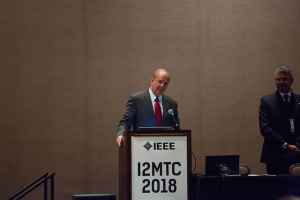The Building Reliable Advancements in Neurotechnology (BRAIN) Center welcomed engineering faculty, staff and students from UH and ASU along with a “who’s who” of industry leaders to the second annual Industry Advisory Board meeting at the Royal Sonesta hotel in Houston, Texas this May.
The BRAIN Center is an industry-university cooperative research center funded with a $1.5 million grant from the National Science Foundation (NSF) and co-located at the University of Houston and Arizona State University. The mission of the BRAIN center – which is led by UH Professor Jose Luis Contreras-Vidal and ASU Professor Marco Santello – is to develop safe, effective and affordable personalized neurotechnologies.
Since its inception the center has attracted nine industry partners, including companies Medtronic, the CORE Institute, Indus Instruments and Brain Vision LLC, as well as medical institutions such as the Phoenix Children’s Hospital, The Institute for Rehabilitation and Research Memorial Hermann Hospital, Houston Methodist and GOGOA Mobility.
Joseph W. Tedesco, Elizabeth D. Rockwell Dean of the UH Cullen College of Engineering, provided opening remarks for the three-day meeting.
“The BRAIN Center is much more than a jumping off point for new neurotechnologies. This Center is a meeting of the minds; a melting pot of ingenuity across academia, industry and government that will bring outstanding advances in neuroscience,” Tedesco said. “That will be the legacy of the BRAIN Center. And that legacy would not be possible without each and every one of the brilliant minds in this room.”
UH and ASU researchers showcased their latest findings across the neuroscience field to experts in government regulation, industry representatives and members of the clinical community, who provide invaluable feedback on best practices for speeding new neurotechnologies to the consumer market.
Contreras-Vidal believes bringing together experts across this wide range of traditionally siloed fields will accelerate innovation of medical devices, diagnostic tools and treatments for a wide range of neurological conditions and diseases, which affect millions around the world.
The Center’s current research thrusts include neurological clinical research, mobility assessment and clinical intervention, invasive neurotechnology, noninvasive neurotechnology and neurorehabilitation technology.
To learn more about the BRAIN Center, visit nsfbrain.org.
